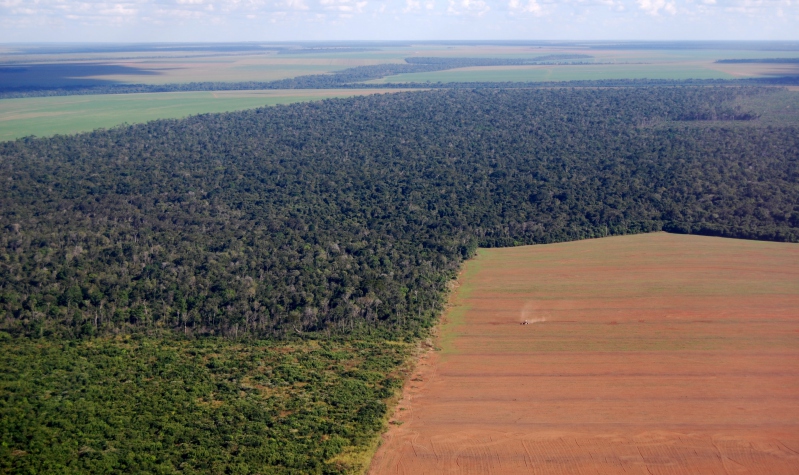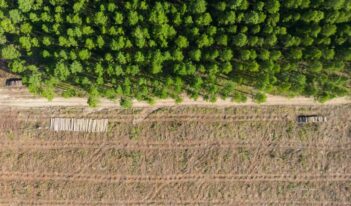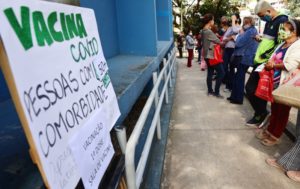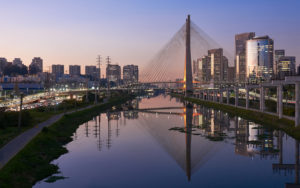
Environmental regulatory rollbacks harm Brazil’s Amazon and its Indigenous communities.
Public discourse about protecting the Amazon rainforest from deforestation requires stronger moral conviction. The ambiguous Brazilian political rhetoric during a recent climate change summit appeared so unconvincing that likely no one took it seriously. Some Brazilian officials have operated as if the so-called “Amazon-paradox” poses an authentic trade-off between value and sustainability. Brazil cannot wait until 2030 to drive meaningful changes in environmental care. The country is facing a predatory deregulatory movement with an inconvenient double entendre: Brazil is selling smoke to the entire planet.
Brazil, alongside India, are now the epicenters of the COVID-19 outbreak. The Brazilian government’s delay in working to control the spread of COVID-19 led to the emergence of the Amazon variant—the SARS-CoV-2 variant P1. The new variant appears to be capable of spreading much quicker and causing higher mortality rates. What was previously considered only a matter of regulatory failure has taken on the dimensions of a humanitarian crisis.
The new Amazon variant has victimized large portions of the population, including local native Indigenous communities. Although deforestation might not seem directly related to the COVID-19 outbreak in Indigenous populations, Brazil’s deforestation campaign developed through its environmental regulatory rollback. This rollback permitted previously illegal environmental practices such as mining, land grabbing, timber logging, and cattle ranching, which contributed to transmitting COVID-19 to native populations. In the region, the local health care systems were overburdened and collapsed as people died from the lack of oxygen and other basic supplies. As a result, Brazil’s Indigenous leaders have sued Brazil’s President Jair Bolsonaro for crimes against humanity.
Demands from President Bolsonaro and Brazil’s former Environment Minister, Ricardo Salles, spurred severe alterations to Brazil’s federal environmental regulations. President Bolsonaro, issued a wide range of executive acts to roll back environmental regulations meant to protect Indigenous territories. President Bolsonaro also decreased the budget for the Brazilian Institute for Environment Protection and Renewable Resources (Ibama)—Brazil’s environmental regulatory agency—by 25 percent, leaving actors in the Amazon region with little scrutiny by federal law enforcement agencies and accountability for corporate wrongdoing. Brazil’s current deregulatory course is destined to dilapidate the Brazilian environmental policy in contravention of Brazilians’ constitutional right to an ecologically balanced environment.
Former Minister Salles is an advocate of logging and the agribusiness sector, and, during his time as Environment Minister, he called for further environmental deregulation. The former Environment Minister suggested that the right-wing government should use the pandemic to “simplify regulation on a large scale” and “run the cattle herd” through the Amazon—likely referring to beef production, which is a major contributor to deforestation in the Amazon.
Age-old strategies of command and control, however, are far from convincing. In any effective plan, Brazil needs to prioritize strengthening inspection bodies at the federal level—Ibama and ICMBio (Chico Mendes Institute for Biodiversity Conservation). Brazil must also strengthen inspection bodies at the state level, including the secretariats for the environment and bodies responsible for the Rural Environmental Registry—a “database for control, monitoring, environmental and economic planning and fighting against deforestation”—in addition to immediately providing accountability for environmental offenses, as the law dictates.
Brazilian institutions, mainly the Federal Prosecutors Ministry need to ensure compliance with environmental policies and rules by monitoring the development of companies’ commercial practices within supply chains to ensure that they do not lead to crimes and other infractions against the environment.
If prosecutors align with civil society organizations, they could develop viable mechanisms for assessing relevant environmental issues and create an evidence-based framework for assessing regulatory impact, institutional monitoring and supervision, and environment protection. As Wharton School professor William S. Laufer suggests, this coordination, could provide a framework for assessing Brazil’s commitment to environmental affairs and the movement toward shaping green, carbon-free environmental policies.
The predatory deregulation of capitalism in Brazil demonstrates the intersection of interests between the state and corporations which seek economic development at the expense of marginalized people and natural ecosystems. To a large extent, the regulatory rollback approach also demonstrates the maintenance, and even the deepening, of the democratic deficit in Brazilian society.
While national and international corporations aggressively explore and profit from the Brazilian ecological heritage, they destroy habitats, pollute land, rivers, and lakes, contaminate food sources, all of which leads to increased structural, symbolic, and direct violence against Indigenous peoples.
Despite the lack of trust in Brazil concerning the government’s commitment to improving environmental conditions, the international community could play a pivotal role in encouraging improved conditions in the Amazon. U.S. President Joseph R. Biden during his campaign supported Brazilian efforts to reduce Amazon deforestation. Furthermore, the United States and other countries may provide aid to Brazil if the country enforces environmental protection measures. The United States may influence Brazil to embrace a modern regulatory strategy that focuses on enhancing transparency, considering evidence-based initiatives, and measuring the impact of regulation on vulnerable communities.
To appeal to the Brazilian government, President Biden’s strategy for new climate regulation should focus on reuniting government agencies, the private sector, NGOs, corporate CEOs, and other stakeholders interested in business practices and outcomes. Also, regulatory programs must rely more on implementation than on aspirations. A new model to overcome Brazil’s greenhouse emissions must be developed jointly by all the actors involved, so policymakers must see “businesses as problem-solvers.”
To find a way out of the Amazon crisis, international bodies could support Brazil’s local monitoring institutions, so they can provide more reliable data on environmentally harmful behavior. International bodies could establish modes of direct communication with decentralized supervisory systems that provide information about deforestation and forest burning hotspots. Otherwise, if the international community insists on the sanctioning approach already announced by President Biden, it may lack the relevant data and context about deforestation rates to impose meaningful sanctions.
An international initiative could also focus on smart solutions provided by technology that uses data from satellite images and machine-learning techniques. Such technologies could provide predictors for increased deforestation, areas vulnerable to environmental victimization, and local communities likely affected by social and environmental corporate wrongdoing within forest areas. Particularly in Brazil, these predictors could be developed initially by mapping the deforestation arc to track the next probable areas of deforestation.
Brazil has already developed a monitoring and detection system for deforestation and forest burning based on remote sensing technology. The system consists of data provided by the PRODES (a geographical information system) and DETER (a real-time deforestation detection system) which analyzes the data provided and sends important information about the probable regulatory violations to law enforcement agencies for investigation. These mapping and monitoring of environmental deforestation also could be used to monitor social victimization and human rights violations.
Addressing the authoritarian dynamics and reducing deforestation in the Amazon is a first-order global issue that requires immediate, substantive attention before it is too late.





